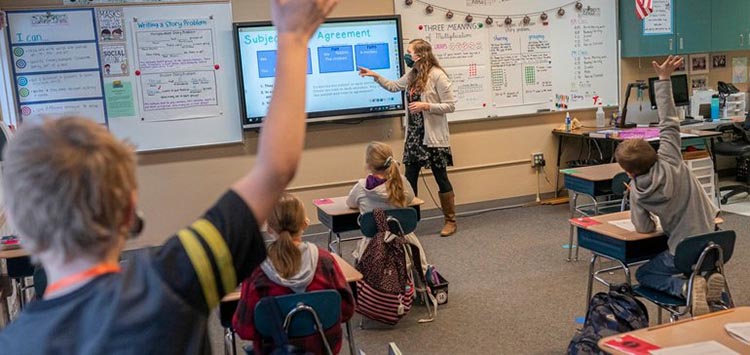
From K-12 Dive
By Kara Arundel
Oct. 20, 2021
Dive Brief:
As schools aim to help students recover academically and emotionally from learning disruptions due to the pandemic, school leaders should give more weight to students’ experiences and perspectives when making instructional and programming decisions, two separate reports on student engagement said.
A State of Engagement survey from the GoGuardian Research and Insights Team found opportunities for student creativity and self-expression had the highest positive effect on student engagement at all grade levels. Project Tomorrow’s Speak Up Research Project emphasized how educators can improve learning experiences by boosting student agency, engagement and equity.
There’s no magic formula to guarantee student engagement, but using various approaches for positive school cultures — such as supportive student-teacher relationships, equitable instructional practices, engaging lessons, and the alignment of decisions with students’ needs and aspirations — can help improve students’ learning experiences, the reports said.
Dive Insight:
The 2021-2022 State of Engagement report, which was released Wednesday, found that academic engagement, curiosity and lifelong learning, critical thinking, social-emotional well-being, and conceptual understanding also contributed highly to student engagement levels.
Historically, providing opportunities for creativity has been one of the most valuable goals of education, and self-expression has given students ways to personally connect to their learning, according to the report’s research, which was based on a survey of 2,664 educators from all 50 states, Washington, D.C., Puerto Rico, and 40 other countries.
The survey also found 81% of teachers said an emphasis on social-emotional well-being has a positive effect on engagement in their classrooms. Belongingness, levels of resilience, and perceived levels of emotional support are just a few of the factors often included in SEL practices.
Increasing opportunities for student engagement may also reengage students whose participation dropped off during remote learning, as well as help with attendance rates.
“Opening up space for young people to share their ideas and to take action together can be a powerful way to address young people’s emotional needs and concerns,” said John Rogers, professor of education and the director of the Institute for Democracy, Education and Access at the University of California, Los Angeles.
“One of the things that helps young people feel whole and feel healthy is to have a sense of agency, to have a sense that they can make a difference,” said Rogers.
The Speak Up Research Project report, which was published in collaboration with learning management company Blackboard, was developed based on feedback from 50,000 K-12 students, parents, teachers and administrators. It found that regardless of whether instruction was in-person or remote last school year, human connection is important for student engagement and achievement. This is particularly vital in remote learning environments where there are often barriers to engaging students in traditional ways.
Although most students are learning in-person this school year, the report shows there is much work to do to raise engagement levels. While 81% of students in grades 6-12 said they want to do well in school, only 41% said they are interested in what they’re learning in school and just 45% said what they were learning in school is important to their futures.
Remote learning did help highlight the importance of developing the skill of self-directed learning, but the absence of a teacher directing the learning process or providing students with a constant stream of feedback had a negative impact on some students’ perceptions of their self-efficacy as learners, according to the report.
“The ability to self-direct one’s own learning is a skill that needs to be explicitly developed with students, in the same ways that teachers are increasingly helping students develop critical thinking or teamwork skills,” the report said.
Photo: Nathan Howard via Getty Images
Read this and other stories at K-12 Dive

